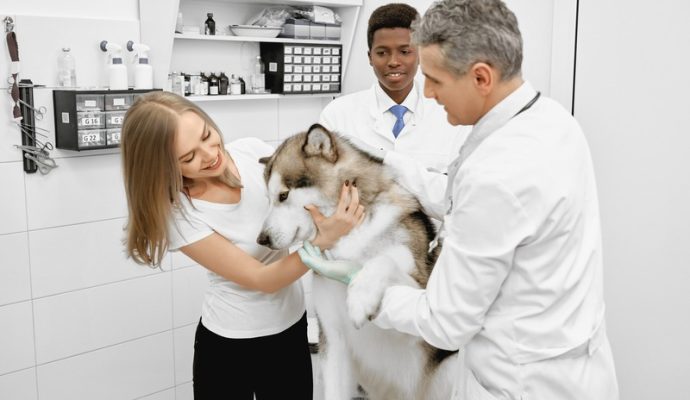Your pet’s dental health is a vital component of their overall well-being. The goal of veterinary dentistry is to help you take care of your pet’s oral hygiene and prevent the onset of common dental issues. In this article, we will cover a range of topics related to veterinary dentistry, including periodontal disease, homecare programs, mechanical and chemical cleaning methods, and the importance of regular dental checks at the vet. So, let’s dive in and explore everything you need to know about pet dental care!
Periodontal disease: The reason behind dental care
Causes and effects of periodontal disease
Periodontal disease is caused by the buildup of bacteria-laden plaque on your pet’s teeth. Left untreated, this can lead to inflammation, gum and bone loss, and eventually tooth loss. The process is painful and, if not managed, can even lead to systemic complications when the bacteria enter the bloodstream. Providing your pet with regular dental care is essential in preventing the progression of periodontal disease.
Importance of dental care in older pets
As your pet ages, the importance of dental care increases. Older pets are more susceptible to dental issues due to factors such as weakened immune systems, increased oral sensitivity, and a higher chance of developing other illnesses. Regular dental care can help keep your aging pet’s mouth healthy and pain-free.
Understanding plaque and tartar
Formation and dangers of plaque
Plaque consists of bacteria, saliva, and food particles that collect on the surface of your pet’s teeth. If not removed, it multiplies and can lead to gum inflammation, infection, and discomfort.
Hardening of plaque into tartar
When plaque isn’t properly cleaned, it can harden into tartar within 48 hours. Tartar is more difficult to remove and requires professional intervention, such as scaling.
Homecare programs for maintaining oral health
The role of the veterinarian
Before starting any home dental care program, consult your veterinarian to identify and address any existing oral problems. This will ensure that your pet’s mouth is healthy and the homecare routine is effective in maintaining good oral hygiene.
Slowing down the progression of gum disease
Homecare is crucial in slowing down gum disease progression. While pet dental treatments can clean and restore your pet’s mouth to a healthy state, without proper homecare, disease will likely recur.
Benefits of effective home care
Adopting an effective homecare routine for your pet’s dental health has multiple benefits: 1. Longer intervals between professional dental cleanings 2. Reduced risk of gum disease and tooth loss 3. Shorter anesthesia time during dental procedures 4. Potential cost savings on pet dental treatments
Mechanical cleaning methods in veterinary dentistry
How mechanical cleaning works
Mechanical cleaning physically removes plaque from your pet’s teeth. Tooth brushing and chewing are the most common mechanical cleaning methods. Using dental chews, toys, and dental-friendly diets can also help maintain your pet’s dental health.
Chewing and tooth brushing
Chewing is a natural way for pets to clean their teeth. However, not all dental chews and foods are equally effective. Select dental products that are appropriate for your pet’s size and chewing habits.
Pet Grooming
While it may not seem directly connected to dental health, regular cat and dog grooming plays a significant role in maintaining overall well-being, including oral health. Grooming sessions can provide an opportunity to monitor your pet’s mouth for any sores, bad breath, or signs of dental distress. Tooth brushing is the most effective method of cleaning your pet’s teeth, helping to remove plaque and prevent the buildup of tartar. It’s essential to use a pet-specific toothbrush and toothpaste to ensure safety and effectiveness.
Chemical cleaning methods in veterinary dentistry
The role of chemical agents in dental care
Chemical cleaning involves the use of antimicrobial agents that target plaque bacteria or compounds that prevent plaque from hardening into tartar.
Common ingredients in pet dental products
Many pet dental products contain chemical agents like enzymes, chlorhexidine, and zinc salts to target bacteria and maintain oral hygiene.
Vet Dentist
Visiting a professional vet dentist for regular checkups and cleanings is an essential part of your pet’s oral health care routine. These experts specialize in addressing dental issues and providing personalized care to keep your pet’s teeth in top shape. With their help, **dog teeth cleaning** and overall oral hygiene can be effectively managed.
Benefits of enzymatic toothpaste, chlorhexidine, zinc salts, and vitamin C
These ingredients provide specific benefits for your pet’s dental health: – Enzymatic toothpaste: Reduces plaque buildup and bad breath – Chlorhexidine: Bacterial and viral killing properties – Zinc salts: Reduce the production of foul-smelling sulfur compounds and enhances the effects of chlorhexidine – Vitamin C: Helps with collagen production and tissue repair.
If you live in the Little Elm area and want to ensure your pet receives expert dental care, consider taking them to veterinarians in Little Elm. These trained professionals will provide your pet with comprehensive dental care, including regular checkups, cleanings, and specialized treatments, if needed.
Conclusion
Your pet’s dental health is an essential component of their overall well-being. It’s crucial to maintain proper oral hygiene through a combination of mechanical and chemical cleaning methods, regular dental checkups, and attentive at-home care. By understanding the importance of veterinary dentistry, you can help your pet maintain a healthy, happy, and pain-free life.




